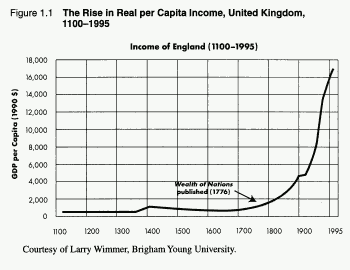This article is more than 1 year old
Royal Weddings, PCs and Cameron's brass balls
Putting public service at the mercy of the market
The answer is...Adam Smith
And the answer is, as you of course have already worked out, Adam Smith.

As you can see the lift off in growth followed on near immediately after Wealth of Nations was published. Correlation is causation, no?
Well no, it isn't. The real reason is technological change. That from the Osborne to the iPad type to technological change. But not, however, the actual changes in the computer systems themselves. This is what is known by the guru of such studies of growth, William Baumol, as invention. The creation of spiffy new things. While that's lovely, that's not really what gives us economic growth. No, that comes from innovation, people finding interesting ways to actually use these inventions. Which leads us to, well, which form of socio-economic organisation maximises innovation? To which the same Baumol says that it is a market system.
Invention can happen, indeed does happen, in any set-up. The Soviets were not short of quite amazing inventions: huge strides forward in the design of lasers that could be used for eye-cutting for example. But it is the market-based societies that got that technology out onto the street where you can get an eye sliced and diced for £500 a time.
Other studies show very similar results. The percentage of the population with a mobile phone is higher where there are competing suppliers of such. A rise of 10 per 100 of the population having a mobile phone adds, in poor countries (ie with no or near no landline system) 0.5 per cent to GDP each year. Yes, really, poor countries with competing mobile phone systems grow faster, by a significant amount, than those with monopolies whether state or private.
Pure market is never really pure
Which brings us to something we are all rather arguing about right now. The role of the state in education and health care. To recap so far: in the long run increased wealth, the possibilities for our children and theirs, depends upon the rate of technological change, of innovation. We know that market systems encourage this more than planned ones. Thus, other things being equal, we would make those descendants of ours better off by having more markets in more things.
Yet we also know that a pure market, an all-markets-all-the-time market, doesn't achieve what we desire in the here and now in services – and in what are partially but not wholly, public goods, such as health care and education.
It doesn't embrace trivial things such as the poor being taught to read or getting their smallpox fixed. Which leaves us with something of a conundrum over our current methods of organisation. We want the State to provide these things, but having such things provided by said State, by planning, in the absence of market forces, reduces the innovation in their provision into the future.
Well, it would, if direct provision or leaving everyone to the mercies of the market were the only possibilities. Which, thankfully, they aren't. For it is entirely possible for us to do what many other countries already do. Sweden in education for example, France (in fact nearly everyone but us) in healthcare.
Have multiple suppliers, some direct, some private or profit, some charitable, but have the financing done, the equal access guaranteed, by the government. It may not be perfect but it is at least arguably (note please, I do not say certainly so, only that one can argue this position) better than either extreme, direct governmental provision at the expense of the future or pure market non-provision to the poor at the expense of the here and now.
This all leads me to an observation I never imagined I would live to make. This break up of State provision of education and healthcare was something that even St Maggie never tried. Far too frightening a course of action even for her. Yet here we have David Cameron quite happily opening up both areas to any willing provider, the State picking up the bill.
Cameron with bigger, brassier, balls than Thatcher: who would ever have thought it?
Or maybe something really has changed in only one grandfather? ®
